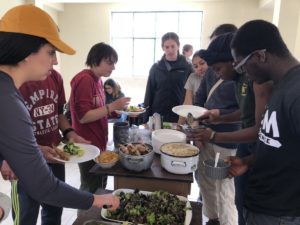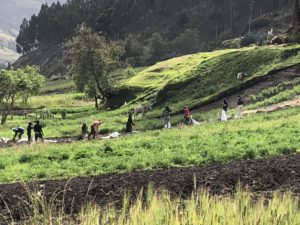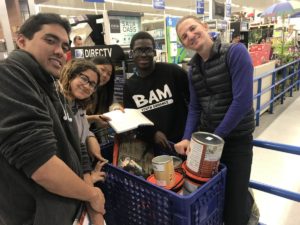We began our day with a 5:30am wakeup call, the earliest wakeup of the trip, in order to simulate the experience of local indigenous workers who begin their days before sunrise in order to get the most out of each day. With curiosity in our minds and sleepy eyes, we rode from the crowded streets of Riobamba to the tranquilindigenous community at El Morino, Gaurote. Once we arrived, we met Cesar Ayol, the elected leader of this community, who served us a breakfast of bread, cheese, hardboiled eggs, and colada morada, a warmed fruity beverage usually served on Día de los Muertos (The Day of the Dead). Over our delicious meal, Cesar discussed the culture, history, and politics of the community. Indigenous people have lived on this same land since colonial times. Historically, Spanish colonists would trap indigenous people in a cycle of debt and labor, which effectively acted as a form of legal slavery. This continued until the 1960s when a series of indigenous uprisings triggered the creation of new laws, ensuring the protection of the rights of indigenous people in Ecuador. The complex history of this indigenous community has led to a blending of colonial and indigenous beliefs and traditions, creating a unique culture and political system. A council comprised of 48 heads of family who appoint community members to political leadership roles leads this community of 280 people. The most important values of the community, which have remained constant throughout the complex indigenous history, are the importance of community and the value of hard work.



After breakfast, we split into smaller groups in order to help the various community projects. The groups were assigned a leader and aided in many chores such as cooking, landscaping, planting vegetables, and putting down fertilizer. At first, the task seemed to be quite simple. After starting, we soon realized this was not the case. Together, about nine of us followed our guide, Gloria, up a steep hill in order to collect the fertilizer. After the long journey of making our way up the hill, we were surprised with the sight of chickens, pigs, dogs, and guinea pigs. We collected several bags of fertilizer for each of the members in our group. The fertilizer was a combination of: chicken, cow, and guinea pig poop, leaves, and unwanted plants. Each person in the group was given a bag to carry down the hill, then down a long path to the fields. After the long exhausting trip to the fields, we found out that we had to pour out the mixture and spread it across a large field. Falsely thinking this was the end, Gloria told us more was needed, so we went back up and did the whole trip again. After laying down the second batch, we were ordered to then dig up dirt and help even out the land all around. As ridiculous as everything sounds, in the end it was worth it. After working, we were hit with the amazing news that we saved Gloria a month of work. But even though we saved her so much time, she still plans to continue where we left off bright and early tomorrow morning.
person in the group was given a bag to carry down the hill, then down a long path to the fields. After the long exhausting trip to the fields, we found out that we had to pour out the mixture and spread it across a large field. Falsely thinking this was the end, Gloria told us more was needed, so we went back up and did the whole trip again. After laying down the second batch, we were ordered to then dig up dirt and help even out the land all around. As ridiculous as everything sounds, in the end it was worth it. After working, we were hit with the amazing news that we saved Gloria a month of work. But even though we saved her so much time, she still plans to continue where we left off bright and early tomorrow morning.

After the tiring but fulfilling day of living like a local, we were given a lunch of fish, salad, vegetable soup, and a rice and quinoa blend before heading back to Hotel Mashany. As soon as we got back, we prepared for our Community Action Project (CAP) presentation to the leaders of a local school. After four glimpsers gave a presentation in Spanish, we discussed the logistics and needs for the project between our group and the school leaders. We eventually decided on working to renovate an upper field area, work to insulate the inside of the school, and create an upper playground area.  Before a well-deserved dinner of pizza, #yum #UnaMásPorFavor, the group continued our work tutoring young students in English at a local school. While the day started early and was filled with lots of hard work, at the end of the day we could all go to bed knowing that our work made an impact. ¡Hasta mañana!
Before a well-deserved dinner of pizza, #yum #UnaMásPorFavor, the group continued our work tutoring young students in English at a local school. While the day started early and was filled with lots of hard work, at the end of the day we could all go to bed knowing that our work made an impact. ¡Hasta mañana!
Erika Pruitt, Kenwood Academy High School
Tim Steves, Highland Park High School

I can’t tell you all how much I appreciate that you post everyday. I look forward to hearing about what you did that day and it has made my daughter being gone for so long a little easier.
Hope you all are having a great time and I can’t wait to get my daughter back in a little less than a week now!
Thank you for detailing what you did today – laborious field work, CAP presentation in Spanish and deciding what project to do, and English tutoring. Thank you for sharing what you ate, also. The pictures were very helpful for me understand the challenges locals face. (I wonder who were elected to present your CAP project in Spanish! I am also curious if your Spanish has improved. Is there anything you can do to help Gloria to increase the productivity of her field work?) Greeting from Denver, CO.
Wow Erika what a busy day!! You and Tim did an outstanding job of describing the day. I was totally engrossed in your experience. I could picture you working so hard. I thought about how you did beautification project o couple of summers ago. You are no stranger to hard work. I’m so proud of you. Thanks for sharing your experience. Love you much. Keep learning and enjoying your experience. GPaL
Aunt Dee Dee
We hope you’re all having fun in Riobamba! Hope each day is filled with laughter and joy and that you aren’t too worn out.
Ps. RB2A follows this blog religiously
Pss. Paco you traitor! We love you! We follow you on Facebook. Say hi to Cesar for us!
Psss. Room 306: Hi roommates! We never met! I lost 3 pouches I bought in plaza roja that say Ecuador on them. If you find them. Please help yourself to them. Thank you!
Loving it. Seeing how the young people are energized while performing the daily task. Again, thanks for the highlights of each day on your journey Global Glimpse. Give my granddaughter Kyra Turner a hello and God continue to bless all the delegates on this trip.
Hola Erika!!! We miss you immensely. Although so glad you had this wonderfully, beautifully amazing experience!!! I am still at awe of how marvelously written and descriptive this post is!!! IT IS AS IF I AM THERE! Shall I be expecting a co-authored book by Erika and Tim? Well, keeping your phone charged and secured until I see you Wednesday. Btw I can’t wait to have your photos developed….mmmmmmmmmWahhh—a big fat, juicy, wet sugar on your adorable cheek. Love, Hugs, Kiss-Kiss, Hugs. JC & the kids (-E21110)
Claire,
Love all the pictures. Looks like you are working hard. Can’t wait to see you and hear about the trip first hand. Love you.